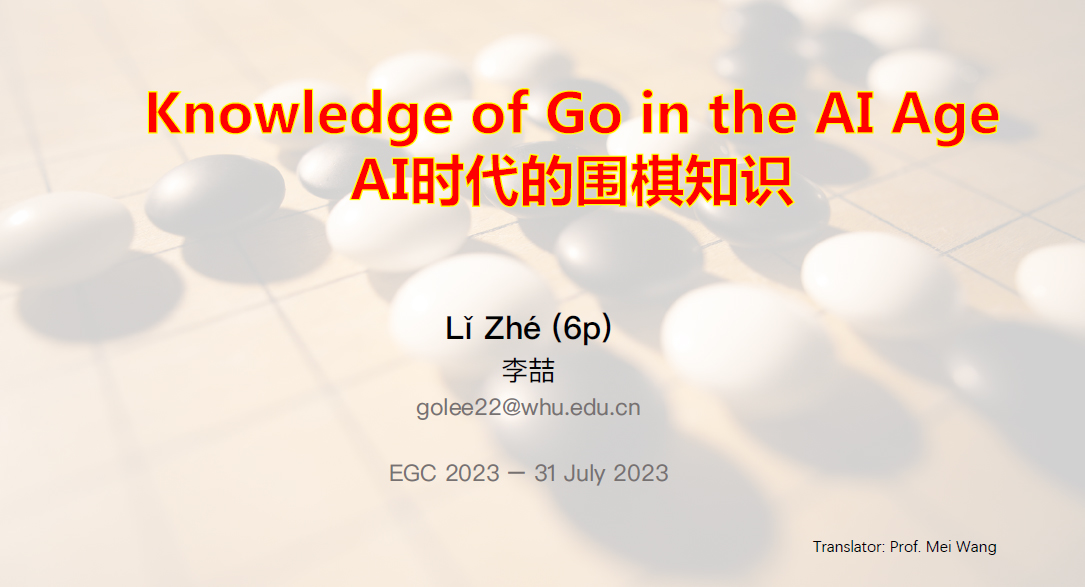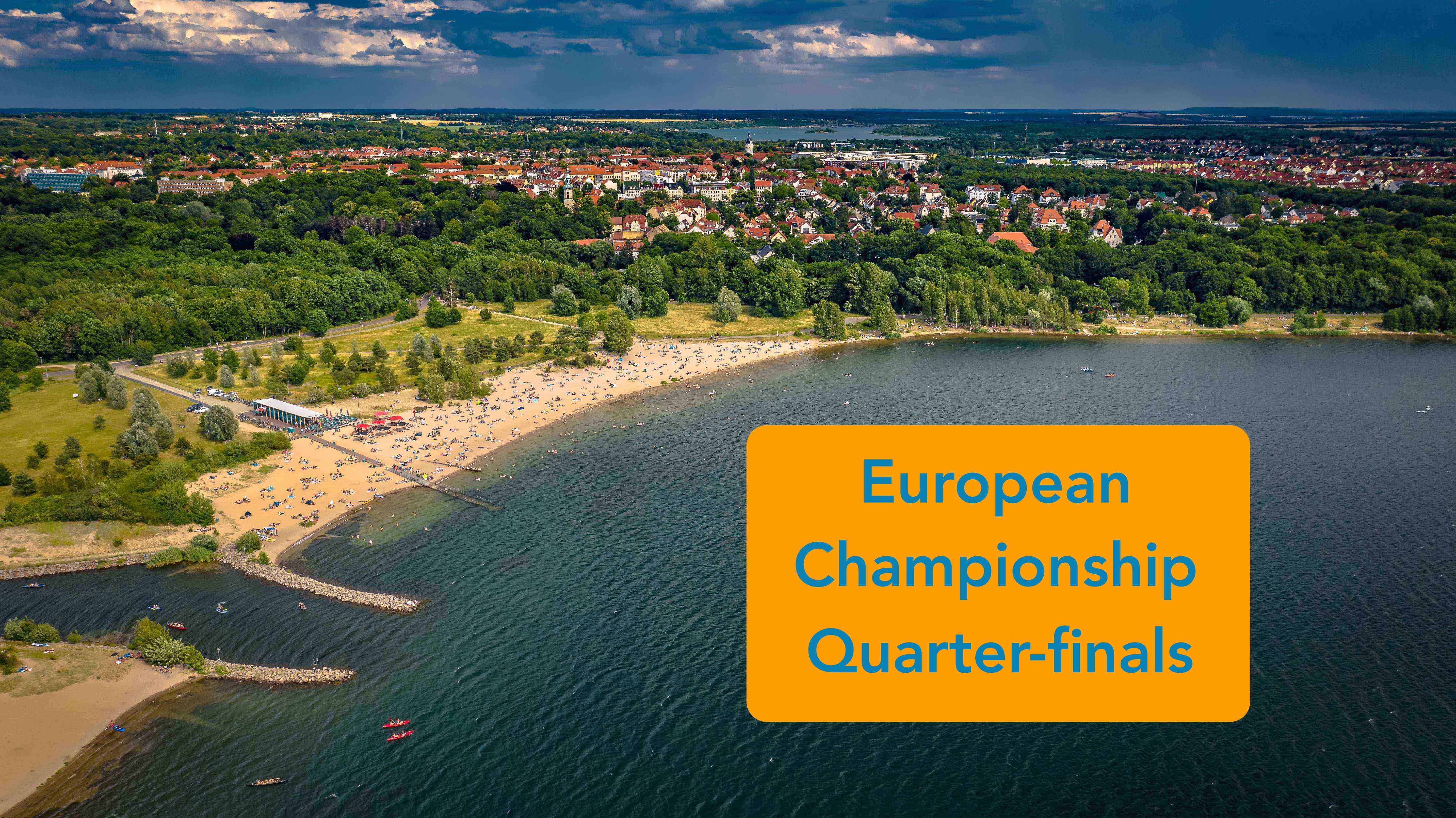On Monday afternoon, women and all other persons not identifying as male were invited to join the Open European Women’s Championship 2023.
Reigning champion Lee Seunghyun 6-dan returned to defend her title. She won her games against Zhang Chao 5-dan from China, who came second place and Manja Marz 3-dan from Germany in third place. Congratulations!

Ms. Lee Seunghyun, 42 years old, is a 6-dan player from South Korea. We’re very glad for the opportunity to interview her afterwards. Here’s what she had to say:
Q: Congratulations on winning the Women’s tournament for the second consecutive time!
Lee: Thank you, I felt very happy. The second game was particularly interesting, as we fought for the whole game.
Q: How do you feel about Women’s tournaments in terms of encouraging diversity within the Go community?
Lee: Well, compared to Korea, the European Go community has a very good environment in terms of diversity. European players in general are a bit weaker than players in China or Korea. So promoting Go for women [by creating dedicated women’s tournaments] is much better. I think it’s a good idea to have a side event where strong European women play Korean 3-dan and 4-dan women. That should be an even match.
Q: How would you describe your style of Go?
Lee: My style…I’m not good at counting, especially endgame, so I want to end games during the middlegame. That’s why I always keep on fighting!
Q: Do you have a role model that inspires you when it come to Go?
Lee: In terms of technique, I don’t have a role model, as I quit playing competitively. But I like people that really enjoy Go as a lifestyle. Like Li Ting volunteering a lot to support the European Go community. I‘m very inspired by people playing Go for the joy of playing and aiming to promote and grow the game. [Li Ting is a 1-dan professional from Kansai Ki-in, living and working in Austria]
Q: How many EGCs have you attended thus far?
Lee: Five times in total. I attended the first time in 2003. It was so amazing to me, because in Korea everyone is so serious about Go and only aims at winning prices. European people just enjoy the Congress no matter what! It was almost a shock to me. I wanted to join many times, but couldn’t. I returned in 2019 and 2020 and I’m happy to be here this year as well. I also promoted this tournament to many Koreans, so this time there are many Korean players.
Q: How long have you been playing Go?
Lee: I think it’s over 30 years. I first got interested in playing Go through my father, then I attended Go academy until I was 20 years old. I was an insei. I wanted to be a professional player, but I couldn’t. So I turned to my job: working in the Go industry.
Q: What’s your profession?
Lee: I am Secretary General of the Korean Baduk Federation in Daegu City.
Q: Can you tell me a bit about the KBF?
Kim Geonhoe: We’re a federation for amateur players in Korea, organizing events promoting Go to children in different communities and so on. [Mr. Kim is the KBF ambassador to the EGC. He kindly set up the interview with Ms. Lee]
Lee: Our yearly budget is around 3 million euro. We have 17 districts within the Korean Go federation [with the KBF acting as governing body]. Go is very serious in Korea, so even as an organization for amateurs, the focus is on elite amateurs. But we’re triying to change the focus to get more real amateurs interested in playing Go.
Q: Are there events at EGC you’re looking forward to?
Lee: There’s so many events. I brought many Korean kids that only attend during the first week. For them, there’s very few tournaments they can join except 9×9 and Rapid. So if you allowed foreigners to play in the children’s tournament, it would be much easier to promote the EGC to Korean kids.
Q: Are lots of Korean kids interested in Go?
Lee: We still have a lot of students, but numbers are decreasing. One of the big reasons is demographic changes in Korea. The birth rate in Korea is very low, so there’s less children to pick up Go. The popularity of Go is also on the decline. Many consider it a game for old people. We try to do something new like developing AI teaching tools to move with the times. But it’s not just an issue for Go. There’s also less people enjoying football, enjoying basketball…
Q: Can you tell us a few things about the Korean Go community?
Lee: We have a lot of players, but they’re mostly very serious. Players here [in Europe] are very diverse in terms of age, strength etc. You have kyu players, dan players, even DDKs. In Korea, if you’re not stronger than 5-dan, no one wants to attend a tournament. They know, they have no chance of winning. Winning is most important, that’s the biggest difference. That’s why our level is quite high, but it’s harder to enjoy it as much.
Q: Is there something you’d like to add? Or a message to your fans?
Lee: I hope EGC will be forever! Next year in Toulouse there will hopefully be even more participants. Many Korean players want to join the EGC here. Compared to my first time at EGC in 2003, the atmosphere has changed a lot. If the atmosphere remains so friendly, many Koreans will want to join. If Koreans just play among themselves, it is meaningless. I hope they mix and play and become friends with people from all over the world – that is really important! So that many Koreans will come join and enjoy EGC like I did.
Q: That’s a nice closing statement. Thank you very much for your time!



